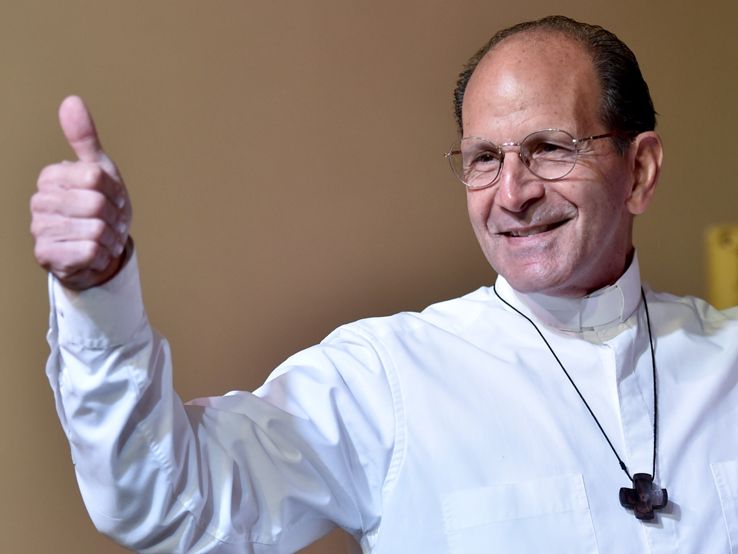Interview
Father Solalinde: ‘Migrants are polarizing the world’
The Mexican candidate for the Nobel Peace Prize spoke with il manifesto about his new book, the state of human rights in his country and relations with the U.S.

“It is curious, but migrants are polarizing the world,” the Mexican priest Alejandro Solalinde, a candidate for the Nobel Peace Prize for 2017, told il manifesto.
Father Solalinde, who escaped an attack by drug traffickers for his commitment in favor of migrants, is currently in Italy to present the Italian translation of his book, Los Narcos Me Queren Muerto (“The Narcos Want Me Dead”). On Tuesday, he was in Udine, where he participated in the Festival “Vicino Lontano” and visited the exhibition “Vivos,” on to the topic of Mexican desaparecidos, an issue Don Solalinde has been working on for years. On May 18, he will be at the Turin International Book Fair, with Moni Ovadia and Alex Zanotelli.
“Few people know, or want to know, that at least 150,000 human beings have gone missing in Mexico, five times the number of people disappeared during the last Argentinian dictatorship,” he writes. ”They have vanished into thin air in the forgotten war in which rival drug dealers face one another to control trade, with the support of entire police and army units. As with many other horrors committed in the course of this conflict, the ‘dress rehearsal’ of DISAPPEARED was made on migrants.”
In Oaxaca, Solalinde runs the hotel for migrants “Hermanos en el camino.” He explains that this structure “was created to protect those migrants from the police and organized crime syndicates. They are the perfect prey for criminals: they do not officially exist, they do not have documents. And for the Mafia, everything has an economic value, even organs. We started to assist them in the main tangible needs, like getting in touch with their families, but we also provide legal assistance, to file a complaint, we collect the different stories, understanding that migration is a complex phenomenon.”
Since the arrival of Trump, has the number of people looking to migrate to the U.S. declined?
A little, yes, but the flow continues. They invent ingenious ways to go. Out of 100 who try to go into the USA, 25 give up and turn back, and 25 others keep trying. But the new data is that 50 percent remain in Mexico and get organized, convinced that Trump will not last and they will be able to try their journey in the future. The repudiation against Trump’s xenophobic policies is strong in the U.S. On May 1, I participated in one of the three giant demonstrations Los Angeles; every time, more and more people go to these marches, and the role of women is obvious. In my opinion, they are losing the fear to organize these demonstrations and they are getting organized. It’s curious, but migrants are polarizing the world. It is clear in the U.S., but also in Mexico. The majority is in favor of migrants; a minority is afraid of them, criminalizes them and exploits them. Organized crime, the National Institute of Migration and Mexican politicians are in coordination with the United States.
In Mexico, demonstrations for migrants have been merged with those against Peña Nieto’s privatizations. Is there a hope for change in the next election?
Yes, there was a big event on Jan. 20 against Trump and against Henríque Peña Nieto’s policies. There were marches in front of the U.S. embassy. Never before has a Mexican president had such a drop in popularity as Nieto. The Morena party, of Amlo [Andrés Manuel López Obrador], could do it this time if the left does not get split again. The independent candidates, like the EZLN are good, but a bit old-fashioned and at this time. As in the past, if the left is divided, the system will win. Morena is a new movement, and we must ensure that it does not grind to a halt. I suggested to Amlo a social control and ethics commission, which has already started functioning.
You have had an important role in the search for the disappeared, including in the case of the 43 students, starting from the confessions of some traffickers. What did they say?
That the students were burnt. This was confirmed by some tests on the remains, but the fire did not happen in the Cucula landfill. The interdisciplinary team of independent experts has come close to the truth starting from the testimonies of three survivors, who attended the last meeting of students with the federal army and the police. On one of the buses, there was a large shipment of heroin. They disappeared in the military barracks, where it is known that there are crematoriums. It is a crime against humanity, which does not expire. A state crime. The investigation will continue only if Amlo wins and things change.
As you wrote in the book, Mexico is a huge mass grave, but the international community, and even bishops, have targeted Venezuela, which welcomes migrants. Why?
When there are large resources at stake, and in this case oil, there is the hand of the CIA and the U.S. that want the geopolitical control. The Pope calls for peace and they call for war. The message of Bishop Ruiz or Monsignor Romero, whom I knew personally, was very different. In 1972, I asked him to help my team of itinerant missionaries, who were not accepted by the local church. But he was delighted: it is the way of the Gospel, he said.
Originally published at https://ilmanifesto.it/padre-solalinde-i-migranti-obbligano-il-mondo-a-scegliere/ on 2017-05-16
